Getting a Job and Employers' Expectations: Skills, Attributes
VerifiedAdded on 2023/01/23
|13
|3049
|73
Report
AI Summary
This report critically evaluates corporate entrepreneurship and intrapreneurship's role in the economy, defining them as processes for innovation and value creation within organizations. It examines entrepreneurial organizations concerning impact, structure, and culture, highlighting their emphasis on performance-based rewards, flexible structures, and innovative cultures. The report analyzes Arcadia Group as an entrepreneurial entity, outlining its business activities, organizational culture, and values, emphasizing its focus on fashion, innovation, and employee development. It then evaluates the author's personal skills, attributes, and behaviors, aligning them with the requirements of a mechanical engineering role at Arcadia Group, demonstrating how their leadership, problem-solving, communication, and technical skills complement the company's needs. The report concludes by underscoring the importance of matching personal capabilities with job requirements for career success.

Getting a job and what employers want
from you?
from you?
Paraphrase This Document
Need a fresh take? Get an instant paraphrase of this document with our AI Paraphraser
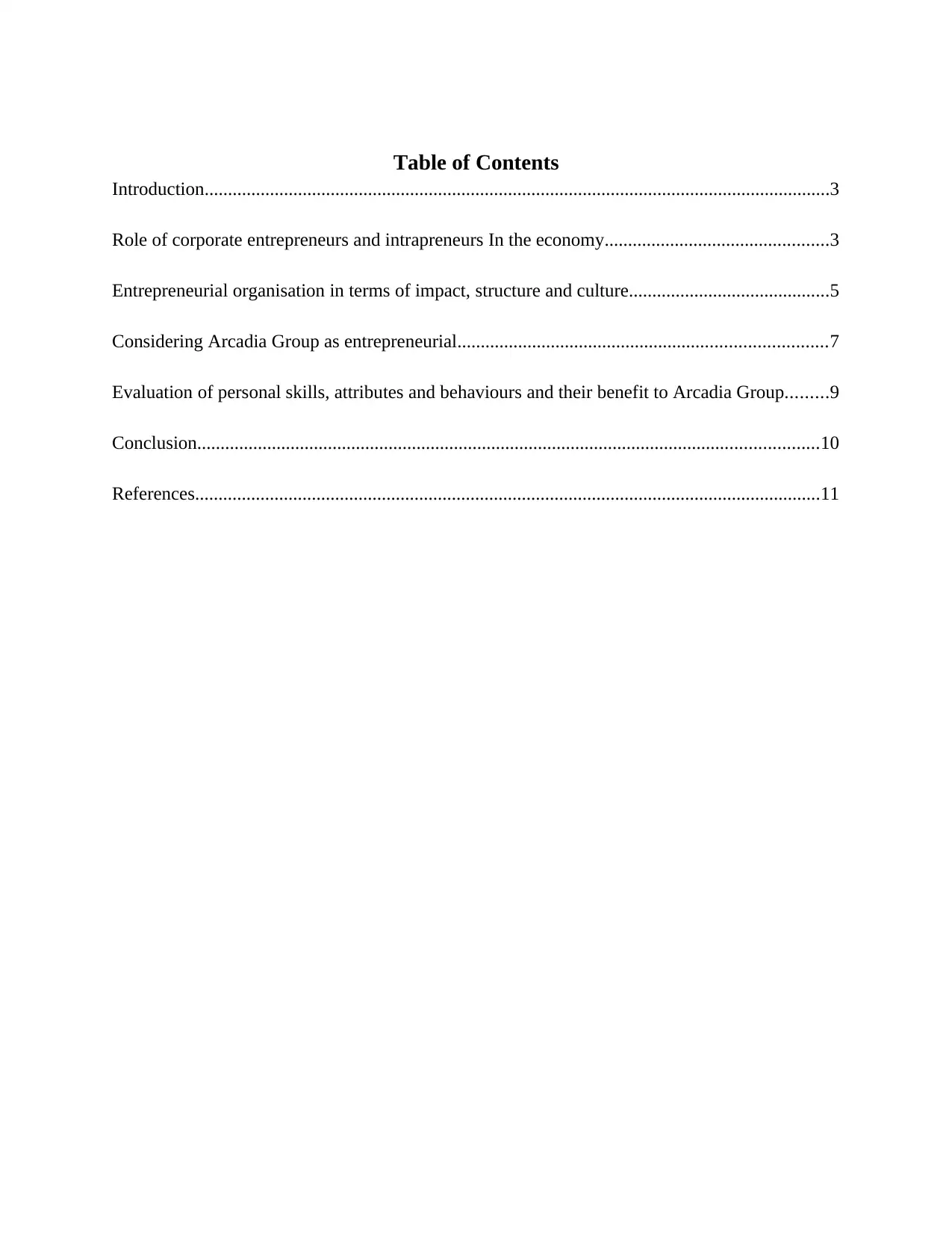
Table of Contents
Introduction......................................................................................................................................3
Role of corporate entrepreneurs and intrapreneurs In the economy................................................3
Entrepreneurial organisation in terms of impact, structure and culture...........................................5
Considering Arcadia Group as entrepreneurial...............................................................................7
Evaluation of personal skills, attributes and behaviours and their benefit to Arcadia Group.........9
Conclusion.....................................................................................................................................10
References......................................................................................................................................11
Introduction......................................................................................................................................3
Role of corporate entrepreneurs and intrapreneurs In the economy................................................3
Entrepreneurial organisation in terms of impact, structure and culture...........................................5
Considering Arcadia Group as entrepreneurial...............................................................................7
Evaluation of personal skills, attributes and behaviours and their benefit to Arcadia Group.........9
Conclusion.....................................................................................................................................10
References......................................................................................................................................11
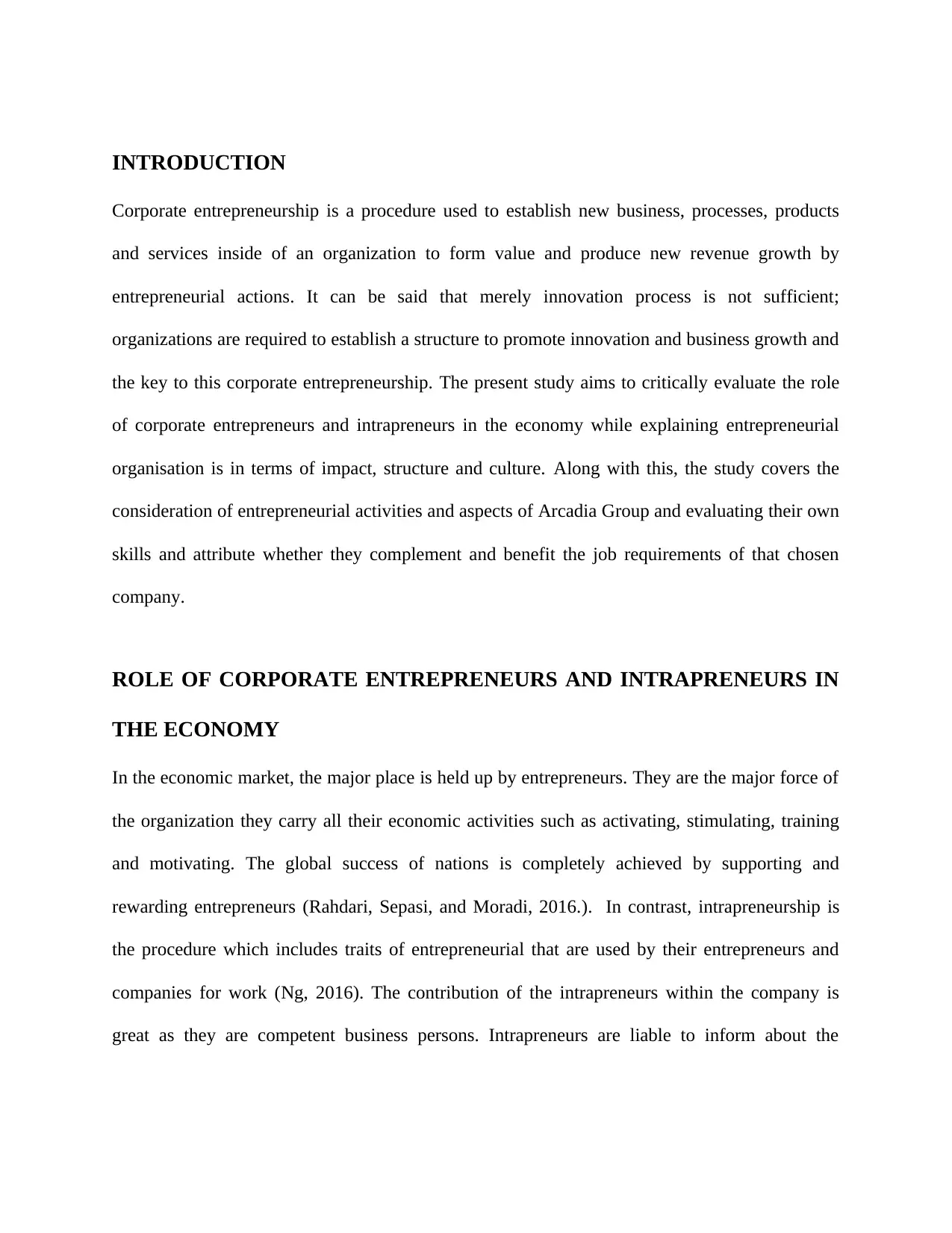
INTRODUCTION
Corporate entrepreneurship is a procedure used to establish new business, processes, products
and services inside of an organization to form value and produce new revenue growth by
entrepreneurial actions. It can be said that merely innovation process is not sufficient;
organizations are required to establish a structure to promote innovation and business growth and
the key to this corporate entrepreneurship. The present study aims to critically evaluate the role
of corporate entrepreneurs and intrapreneurs in the economy while explaining entrepreneurial
organisation is in terms of impact, structure and culture. Along with this, the study covers the
consideration of entrepreneurial activities and aspects of Arcadia Group and evaluating their own
skills and attribute whether they complement and benefit the job requirements of that chosen
company.
ROLE OF CORPORATE ENTREPRENEURS AND INTRAPRENEURS IN
THE ECONOMY
In the economic market, the major place is held up by entrepreneurs. They are the major force of
the organization they carry all their economic activities such as activating, stimulating, training
and motivating. The global success of nations is completely achieved by supporting and
rewarding entrepreneurs (Rahdari, Sepasi, and Moradi, 2016.). In contrast, intrapreneurship is
the procedure which includes traits of entrepreneurial that are used by their entrepreneurs and
companies for work (Ng, 2016). The contribution of the intrapreneurs within the company is
great as they are competent business persons. Intrapreneurs are liable to inform about the
Corporate entrepreneurship is a procedure used to establish new business, processes, products
and services inside of an organization to form value and produce new revenue growth by
entrepreneurial actions. It can be said that merely innovation process is not sufficient;
organizations are required to establish a structure to promote innovation and business growth and
the key to this corporate entrepreneurship. The present study aims to critically evaluate the role
of corporate entrepreneurs and intrapreneurs in the economy while explaining entrepreneurial
organisation is in terms of impact, structure and culture. Along with this, the study covers the
consideration of entrepreneurial activities and aspects of Arcadia Group and evaluating their own
skills and attribute whether they complement and benefit the job requirements of that chosen
company.
ROLE OF CORPORATE ENTREPRENEURS AND INTRAPRENEURS IN
THE ECONOMY
In the economic market, the major place is held up by entrepreneurs. They are the major force of
the organization they carry all their economic activities such as activating, stimulating, training
and motivating. The global success of nations is completely achieved by supporting and
rewarding entrepreneurs (Rahdari, Sepasi, and Moradi, 2016.). In contrast, intrapreneurship is
the procedure which includes traits of entrepreneurial that are used by their entrepreneurs and
companies for work (Ng, 2016). The contribution of the intrapreneurs within the company is
great as they are competent business persons. Intrapreneurs are liable to inform about the
⊘ This is a preview!⊘
Do you want full access?
Subscribe today to unlock all pages.

Trusted by 1+ million students worldwide
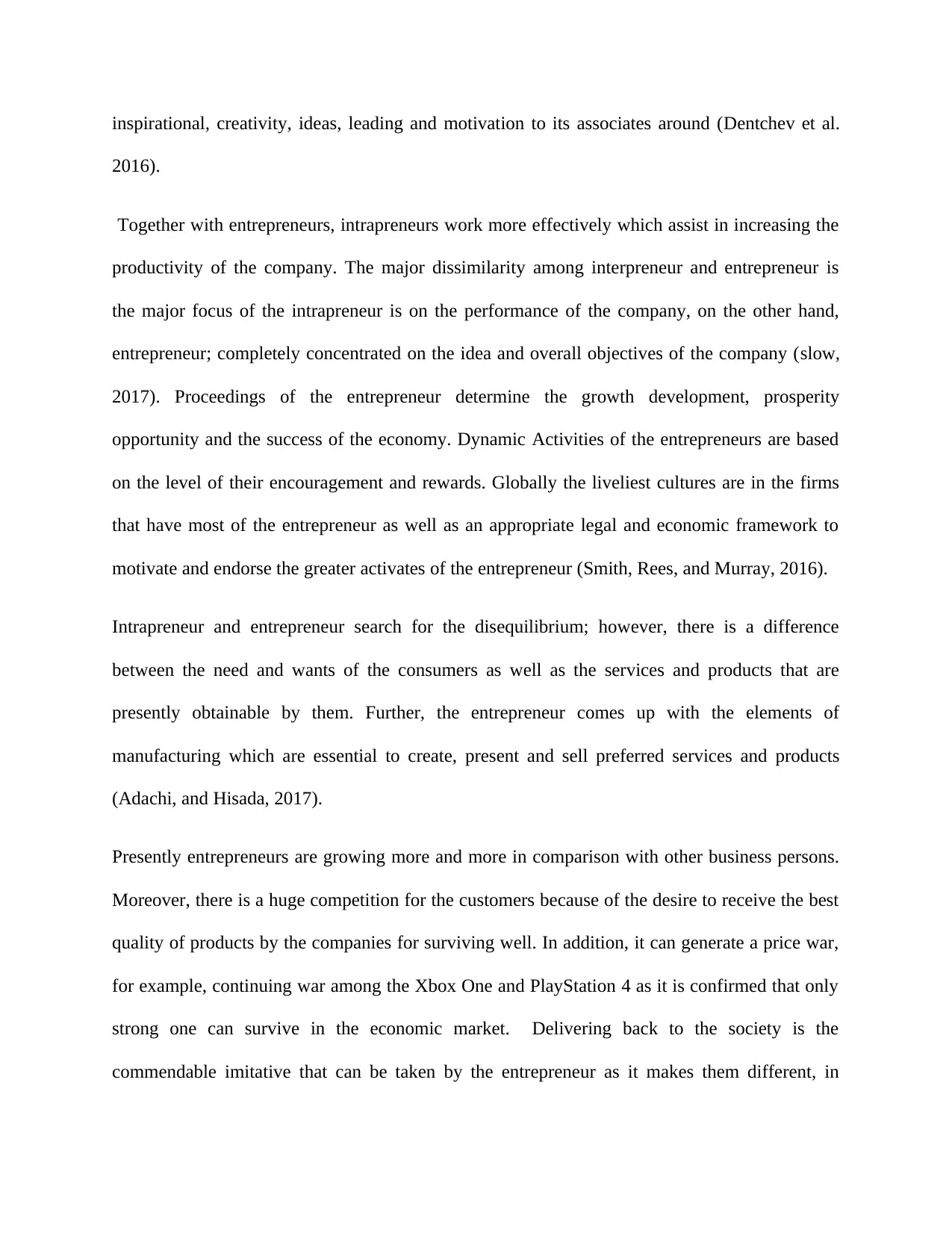
inspirational, creativity, ideas, leading and motivation to its associates around (Dentchev et al.
2016).
Together with entrepreneurs, intrapreneurs work more effectively which assist in increasing the
productivity of the company. The major dissimilarity among interpreneur and entrepreneur is
the major focus of the intrapreneur is on the performance of the company, on the other hand,
entrepreneur; completely concentrated on the idea and overall objectives of the company (slow,
2017). Proceedings of the entrepreneur determine the growth development, prosperity
opportunity and the success of the economy. Dynamic Activities of the entrepreneurs are based
on the level of their encouragement and rewards. Globally the liveliest cultures are in the firms
that have most of the entrepreneur as well as an appropriate legal and economic framework to
motivate and endorse the greater activates of the entrepreneur (Smith, Rees, and Murray, 2016).
Intrapreneur and entrepreneur search for the disequilibrium; however, there is a difference
between the need and wants of the consumers as well as the services and products that are
presently obtainable by them. Further, the entrepreneur comes up with the elements of
manufacturing which are essential to create, present and sell preferred services and products
(Adachi, and Hisada, 2017).
Presently entrepreneurs are growing more and more in comparison with other business persons.
Moreover, there is a huge competition for the customers because of the desire to receive the best
quality of products by the companies for surviving well. In addition, it can generate a price war,
for example, continuing war among the Xbox One and PlayStation 4 as it is confirmed that only
strong one can survive in the economic market. Delivering back to the society is the
commendable imitative that can be taken by the entrepreneur as it makes them different, in
2016).
Together with entrepreneurs, intrapreneurs work more effectively which assist in increasing the
productivity of the company. The major dissimilarity among interpreneur and entrepreneur is
the major focus of the intrapreneur is on the performance of the company, on the other hand,
entrepreneur; completely concentrated on the idea and overall objectives of the company (slow,
2017). Proceedings of the entrepreneur determine the growth development, prosperity
opportunity and the success of the economy. Dynamic Activities of the entrepreneurs are based
on the level of their encouragement and rewards. Globally the liveliest cultures are in the firms
that have most of the entrepreneur as well as an appropriate legal and economic framework to
motivate and endorse the greater activates of the entrepreneur (Smith, Rees, and Murray, 2016).
Intrapreneur and entrepreneur search for the disequilibrium; however, there is a difference
between the need and wants of the consumers as well as the services and products that are
presently obtainable by them. Further, the entrepreneur comes up with the elements of
manufacturing which are essential to create, present and sell preferred services and products
(Adachi, and Hisada, 2017).
Presently entrepreneurs are growing more and more in comparison with other business persons.
Moreover, there is a huge competition for the customers because of the desire to receive the best
quality of products by the companies for surviving well. In addition, it can generate a price war,
for example, continuing war among the Xbox One and PlayStation 4 as it is confirmed that only
strong one can survive in the economic market. Delivering back to the society is the
commendable imitative that can be taken by the entrepreneur as it makes them different, in
Paraphrase This Document
Need a fresh take? Get an instant paraphrase of this document with our AI Paraphraser
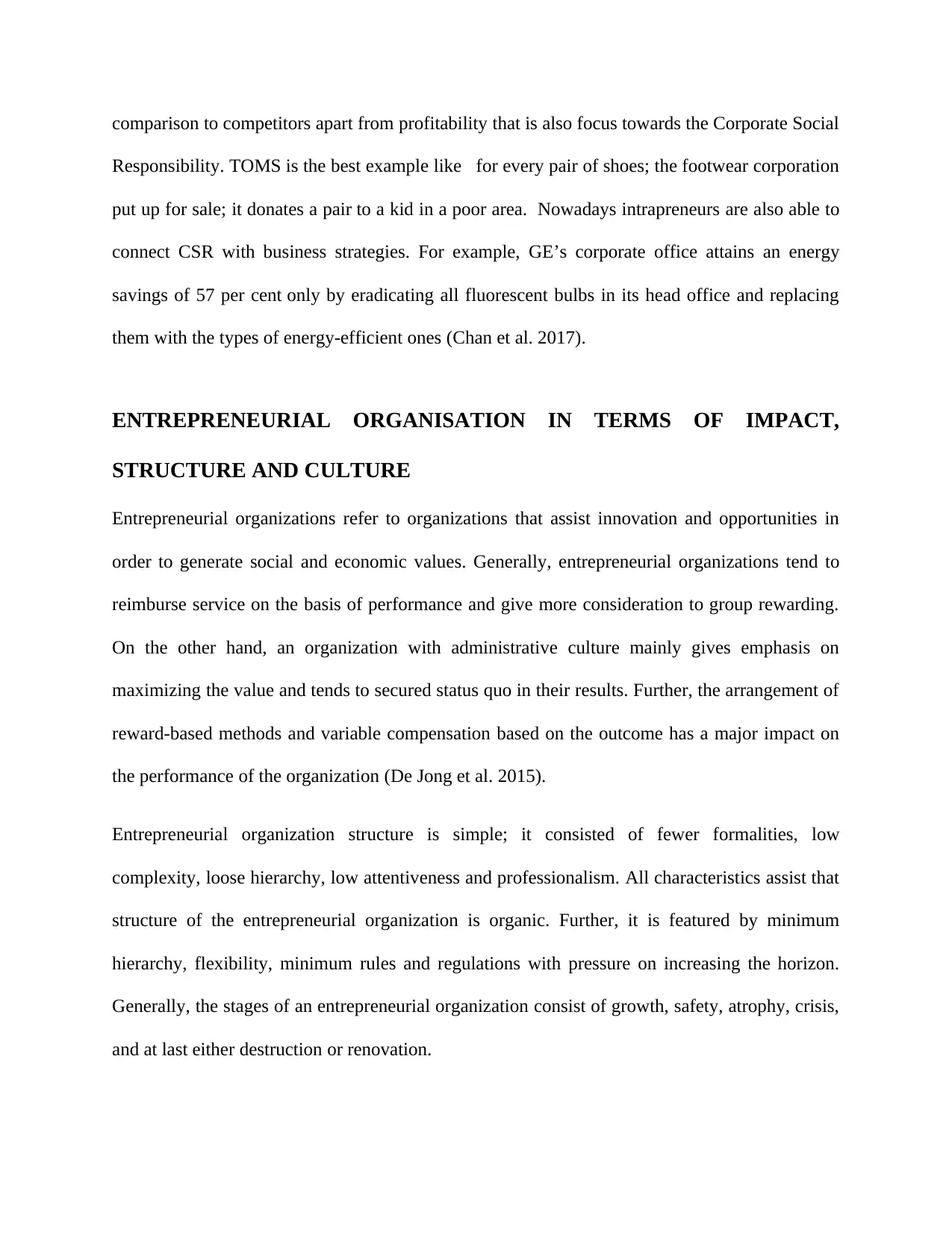
comparison to competitors apart from profitability that is also focus towards the Corporate Social
Responsibility. TOMS is the best example like for every pair of shoes; the footwear corporation
put up for sale; it donates a pair to a kid in a poor area. Nowadays intrapreneurs are also able to
connect CSR with business strategies. For example, GE’s corporate office attains an energy
savings of 57 per cent only by eradicating all fluorescent bulbs in its head office and replacing
them with the types of energy-efficient ones (Chan et al. 2017).
ENTREPRENEURIAL ORGANISATION IN TERMS OF IMPACT,
STRUCTURE AND CULTURE
Entrepreneurial organizations refer to organizations that assist innovation and opportunities in
order to generate social and economic values. Generally, entrepreneurial organizations tend to
reimburse service on the basis of performance and give more consideration to group rewarding.
On the other hand, an organization with administrative culture mainly gives emphasis on
maximizing the value and tends to secured status quo in their results. Further, the arrangement of
reward-based methods and variable compensation based on the outcome has a major impact on
the performance of the organization (De Jong et al. 2015).
Entrepreneurial organization structure is simple; it consisted of fewer formalities, low
complexity, loose hierarchy, low attentiveness and professionalism. All characteristics assist that
structure of the entrepreneurial organization is organic. Further, it is featured by minimum
hierarchy, flexibility, minimum rules and regulations with pressure on increasing the horizon.
Generally, the stages of an entrepreneurial organization consist of growth, safety, atrophy, crisis,
and at last either destruction or renovation.
Responsibility. TOMS is the best example like for every pair of shoes; the footwear corporation
put up for sale; it donates a pair to a kid in a poor area. Nowadays intrapreneurs are also able to
connect CSR with business strategies. For example, GE’s corporate office attains an energy
savings of 57 per cent only by eradicating all fluorescent bulbs in its head office and replacing
them with the types of energy-efficient ones (Chan et al. 2017).
ENTREPRENEURIAL ORGANISATION IN TERMS OF IMPACT,
STRUCTURE AND CULTURE
Entrepreneurial organizations refer to organizations that assist innovation and opportunities in
order to generate social and economic values. Generally, entrepreneurial organizations tend to
reimburse service on the basis of performance and give more consideration to group rewarding.
On the other hand, an organization with administrative culture mainly gives emphasis on
maximizing the value and tends to secured status quo in their results. Further, the arrangement of
reward-based methods and variable compensation based on the outcome has a major impact on
the performance of the organization (De Jong et al. 2015).
Entrepreneurial organization structure is simple; it consisted of fewer formalities, low
complexity, loose hierarchy, low attentiveness and professionalism. All characteristics assist that
structure of the entrepreneurial organization is organic. Further, it is featured by minimum
hierarchy, flexibility, minimum rules and regulations with pressure on increasing the horizon.
Generally, the stages of an entrepreneurial organization consist of growth, safety, atrophy, crisis,
and at last either destruction or renovation.
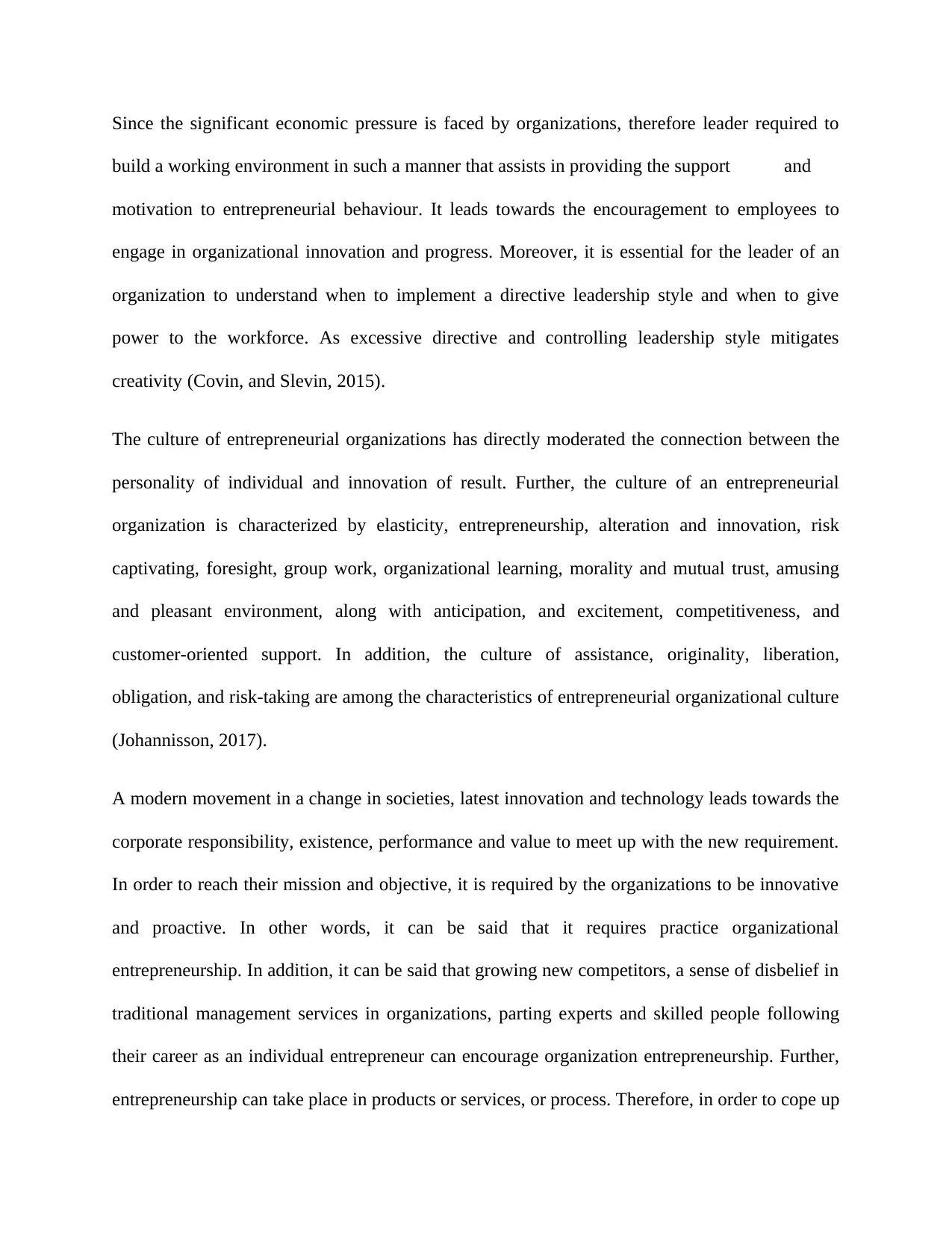
Since the significant economic pressure is faced by organizations, therefore leader required to
build a working environment in such a manner that assists in providing the support and
motivation to entrepreneurial behaviour. It leads towards the encouragement to employees to
engage in organizational innovation and progress. Moreover, it is essential for the leader of an
organization to understand when to implement a directive leadership style and when to give
power to the workforce. As excessive directive and controlling leadership style mitigates
creativity (Covin, and Slevin, 2015).
The culture of entrepreneurial organizations has directly moderated the connection between the
personality of individual and innovation of result. Further, the culture of an entrepreneurial
organization is characterized by elasticity, entrepreneurship, alteration and innovation, risk
captivating, foresight, group work, organizational learning, morality and mutual trust, amusing
and pleasant environment, along with anticipation, and excitement, competitiveness, and
customer-oriented support. In addition, the culture of assistance, originality, liberation,
obligation, and risk-taking are among the characteristics of entrepreneurial organizational culture
(Johannisson, 2017).
A modern movement in a change in societies, latest innovation and technology leads towards the
corporate responsibility, existence, performance and value to meet up with the new requirement.
In order to reach their mission and objective, it is required by the organizations to be innovative
and proactive. In other words, it can be said that it requires practice organizational
entrepreneurship. In addition, it can be said that growing new competitors, a sense of disbelief in
traditional management services in organizations, parting experts and skilled people following
their career as an individual entrepreneur can encourage organization entrepreneurship. Further,
entrepreneurship can take place in products or services, or process. Therefore, in order to cope up
build a working environment in such a manner that assists in providing the support and
motivation to entrepreneurial behaviour. It leads towards the encouragement to employees to
engage in organizational innovation and progress. Moreover, it is essential for the leader of an
organization to understand when to implement a directive leadership style and when to give
power to the workforce. As excessive directive and controlling leadership style mitigates
creativity (Covin, and Slevin, 2015).
The culture of entrepreneurial organizations has directly moderated the connection between the
personality of individual and innovation of result. Further, the culture of an entrepreneurial
organization is characterized by elasticity, entrepreneurship, alteration and innovation, risk
captivating, foresight, group work, organizational learning, morality and mutual trust, amusing
and pleasant environment, along with anticipation, and excitement, competitiveness, and
customer-oriented support. In addition, the culture of assistance, originality, liberation,
obligation, and risk-taking are among the characteristics of entrepreneurial organizational culture
(Johannisson, 2017).
A modern movement in a change in societies, latest innovation and technology leads towards the
corporate responsibility, existence, performance and value to meet up with the new requirement.
In order to reach their mission and objective, it is required by the organizations to be innovative
and proactive. In other words, it can be said that it requires practice organizational
entrepreneurship. In addition, it can be said that growing new competitors, a sense of disbelief in
traditional management services in organizations, parting experts and skilled people following
their career as an individual entrepreneur can encourage organization entrepreneurship. Further,
entrepreneurship can take place in products or services, or process. Therefore, in order to cope up
⊘ This is a preview!⊘
Do you want full access?
Subscribe today to unlock all pages.

Trusted by 1+ million students worldwide
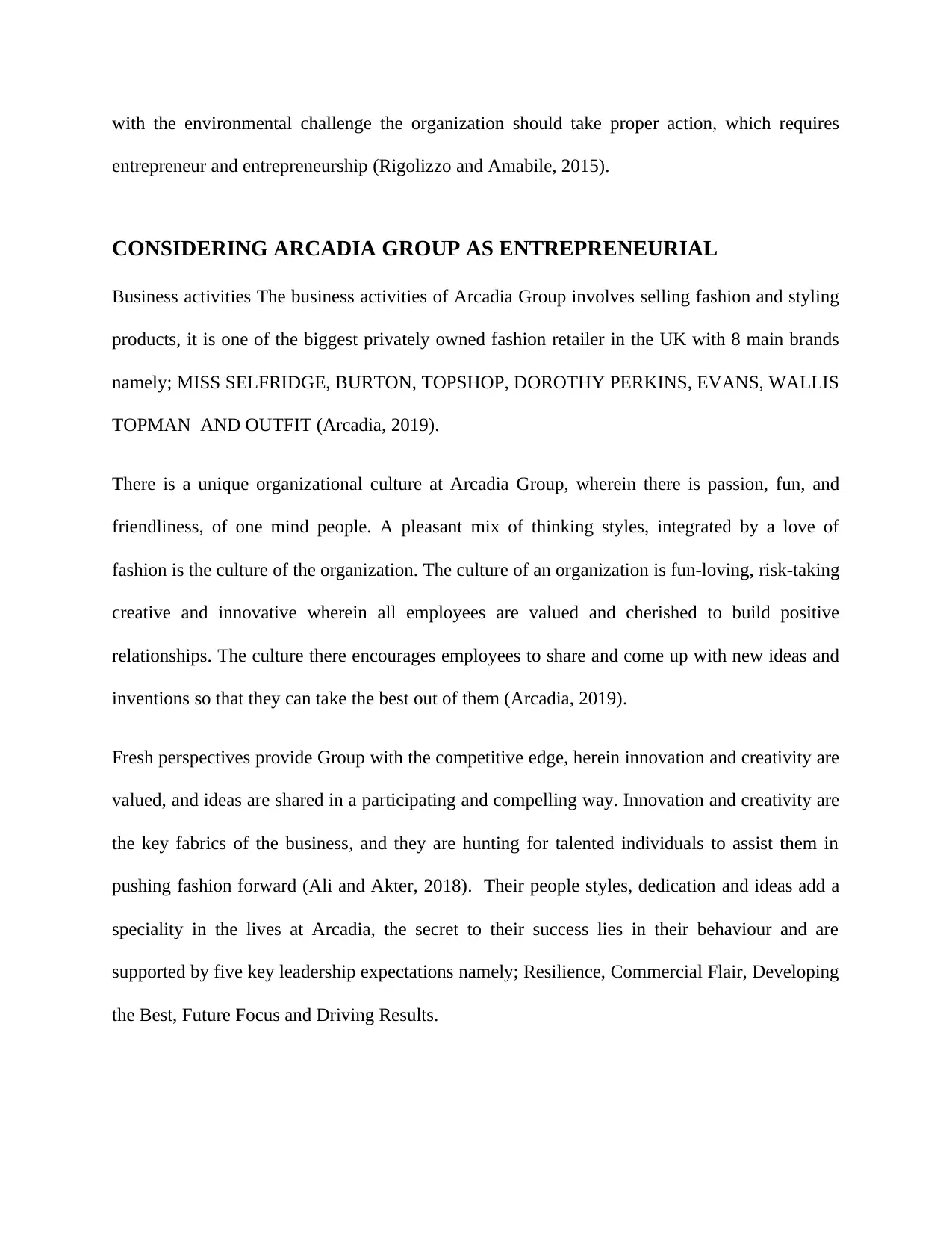
with the environmental challenge the organization should take proper action, which requires
entrepreneur and entrepreneurship (Rigolizzo and Amabile, 2015).
CONSIDERING ARCADIA GROUP AS ENTREPRENEURIAL
Business activities The business activities of Arcadia Group involves selling fashion and styling
products, it is one of the biggest privately owned fashion retailer in the UK with 8 main brands
namely; MISS SELFRIDGE, BURTON, TOPSHOP, DOROTHY PERKINS, EVANS, WALLIS
TOPMAN AND OUTFIT (Arcadia, 2019).
There is a unique organizational culture at Arcadia Group, wherein there is passion, fun, and
friendliness, of one mind people. A pleasant mix of thinking styles, integrated by a love of
fashion is the culture of the organization. The culture of an organization is fun-loving, risk-taking
creative and innovative wherein all employees are valued and cherished to build positive
relationships. The culture there encourages employees to share and come up with new ideas and
inventions so that they can take the best out of them (Arcadia, 2019).
Fresh perspectives provide Group with the competitive edge, herein innovation and creativity are
valued, and ideas are shared in a participating and compelling way. Innovation and creativity are
the key fabrics of the business, and they are hunting for talented individuals to assist them in
pushing fashion forward (Ali and Akter, 2018). Their people styles, dedication and ideas add a
speciality in the lives at Arcadia, the secret to their success lies in their behaviour and are
supported by five key leadership expectations namely; Resilience, Commercial Flair, Developing
the Best, Future Focus and Driving Results.
entrepreneur and entrepreneurship (Rigolizzo and Amabile, 2015).
CONSIDERING ARCADIA GROUP AS ENTREPRENEURIAL
Business activities The business activities of Arcadia Group involves selling fashion and styling
products, it is one of the biggest privately owned fashion retailer in the UK with 8 main brands
namely; MISS SELFRIDGE, BURTON, TOPSHOP, DOROTHY PERKINS, EVANS, WALLIS
TOPMAN AND OUTFIT (Arcadia, 2019).
There is a unique organizational culture at Arcadia Group, wherein there is passion, fun, and
friendliness, of one mind people. A pleasant mix of thinking styles, integrated by a love of
fashion is the culture of the organization. The culture of an organization is fun-loving, risk-taking
creative and innovative wherein all employees are valued and cherished to build positive
relationships. The culture there encourages employees to share and come up with new ideas and
inventions so that they can take the best out of them (Arcadia, 2019).
Fresh perspectives provide Group with the competitive edge, herein innovation and creativity are
valued, and ideas are shared in a participating and compelling way. Innovation and creativity are
the key fabrics of the business, and they are hunting for talented individuals to assist them in
pushing fashion forward (Ali and Akter, 2018). Their people styles, dedication and ideas add a
speciality in the lives at Arcadia, the secret to their success lies in their behaviour and are
supported by five key leadership expectations namely; Resilience, Commercial Flair, Developing
the Best, Future Focus and Driving Results.
Paraphrase This Document
Need a fresh take? Get an instant paraphrase of this document with our AI Paraphraser
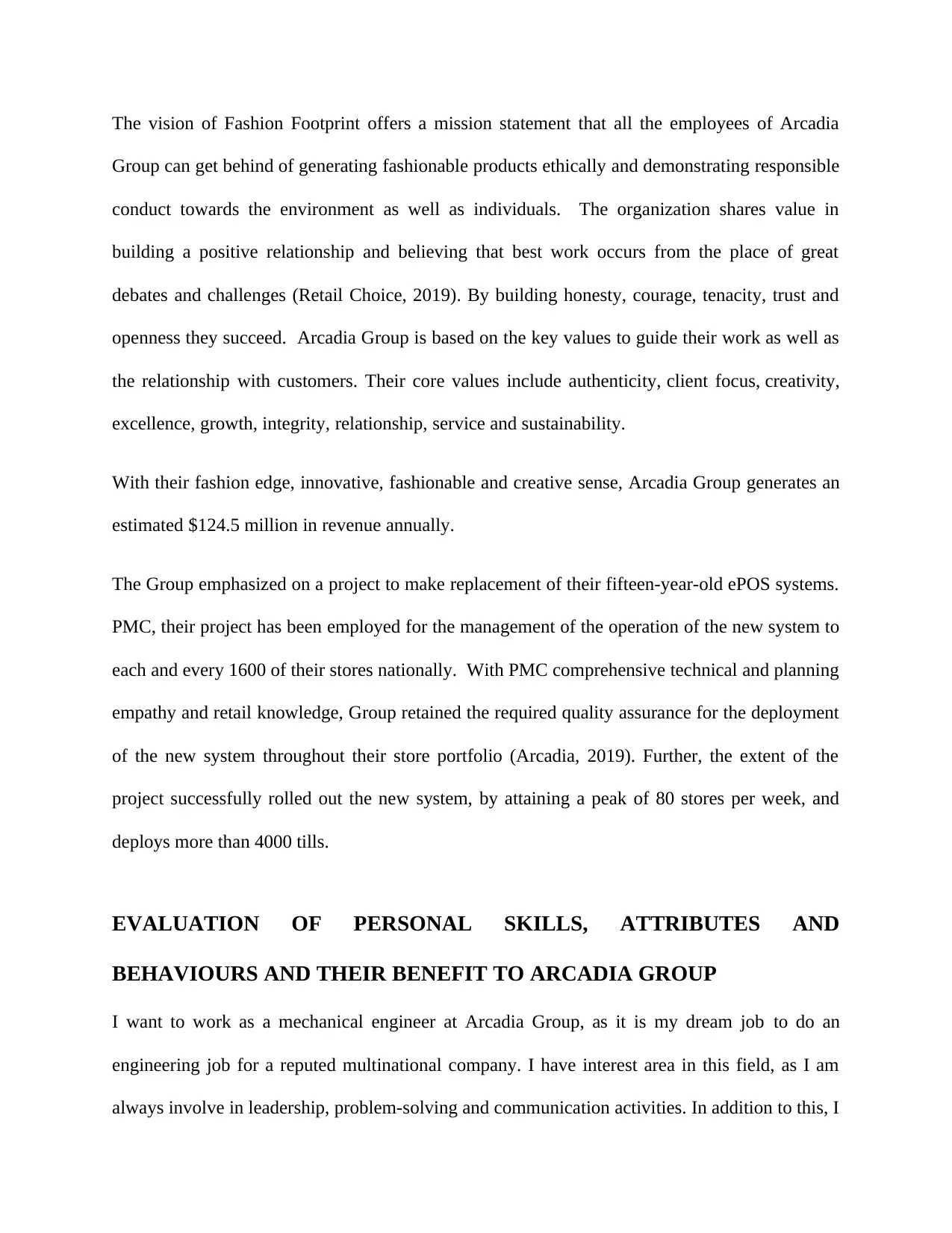
The vision of Fashion Footprint offers a mission statement that all the employees of Arcadia
Group can get behind of generating fashionable products ethically and demonstrating responsible
conduct towards the environment as well as individuals. The organization shares value in
building a positive relationship and believing that best work occurs from the place of great
debates and challenges (Retail Choice, 2019). By building honesty, courage, tenacity, trust and
openness they succeed. Arcadia Group is based on the key values to guide their work as well as
the relationship with customers. Their core values include authenticity, client focus, creativity,
excellence, growth, integrity, relationship, service and sustainability.
With their fashion edge, innovative, fashionable and creative sense, Arcadia Group generates an
estimated $124.5 million in revenue annually.
The Group emphasized on a project to make replacement of their fifteen-year-old ePOS systems.
PMC, their project has been employed for the management of the operation of the new system to
each and every 1600 of their stores nationally. With PMC comprehensive technical and planning
empathy and retail knowledge, Group retained the required quality assurance for the deployment
of the new system throughout their store portfolio (Arcadia, 2019). Further, the extent of the
project successfully rolled out the new system, by attaining a peak of 80 stores per week, and
deploys more than 4000 tills.
EVALUATION OF PERSONAL SKILLS, ATTRIBUTES AND
BEHAVIOURS AND THEIR BENEFIT TO ARCADIA GROUP
I want to work as a mechanical engineer at Arcadia Group, as it is my dream job to do an
engineering job for a reputed multinational company. I have interest area in this field, as I am
always involve in leadership, problem-solving and communication activities. In addition to this, I
Group can get behind of generating fashionable products ethically and demonstrating responsible
conduct towards the environment as well as individuals. The organization shares value in
building a positive relationship and believing that best work occurs from the place of great
debates and challenges (Retail Choice, 2019). By building honesty, courage, tenacity, trust and
openness they succeed. Arcadia Group is based on the key values to guide their work as well as
the relationship with customers. Their core values include authenticity, client focus, creativity,
excellence, growth, integrity, relationship, service and sustainability.
With their fashion edge, innovative, fashionable and creative sense, Arcadia Group generates an
estimated $124.5 million in revenue annually.
The Group emphasized on a project to make replacement of their fifteen-year-old ePOS systems.
PMC, their project has been employed for the management of the operation of the new system to
each and every 1600 of their stores nationally. With PMC comprehensive technical and planning
empathy and retail knowledge, Group retained the required quality assurance for the deployment
of the new system throughout their store portfolio (Arcadia, 2019). Further, the extent of the
project successfully rolled out the new system, by attaining a peak of 80 stores per week, and
deploys more than 4000 tills.
EVALUATION OF PERSONAL SKILLS, ATTRIBUTES AND
BEHAVIOURS AND THEIR BENEFIT TO ARCADIA GROUP
I want to work as a mechanical engineer at Arcadia Group, as it is my dream job to do an
engineering job for a reputed multinational company. I have interest area in this field, as I am
always involve in leadership, problem-solving and communication activities. In addition to this, I
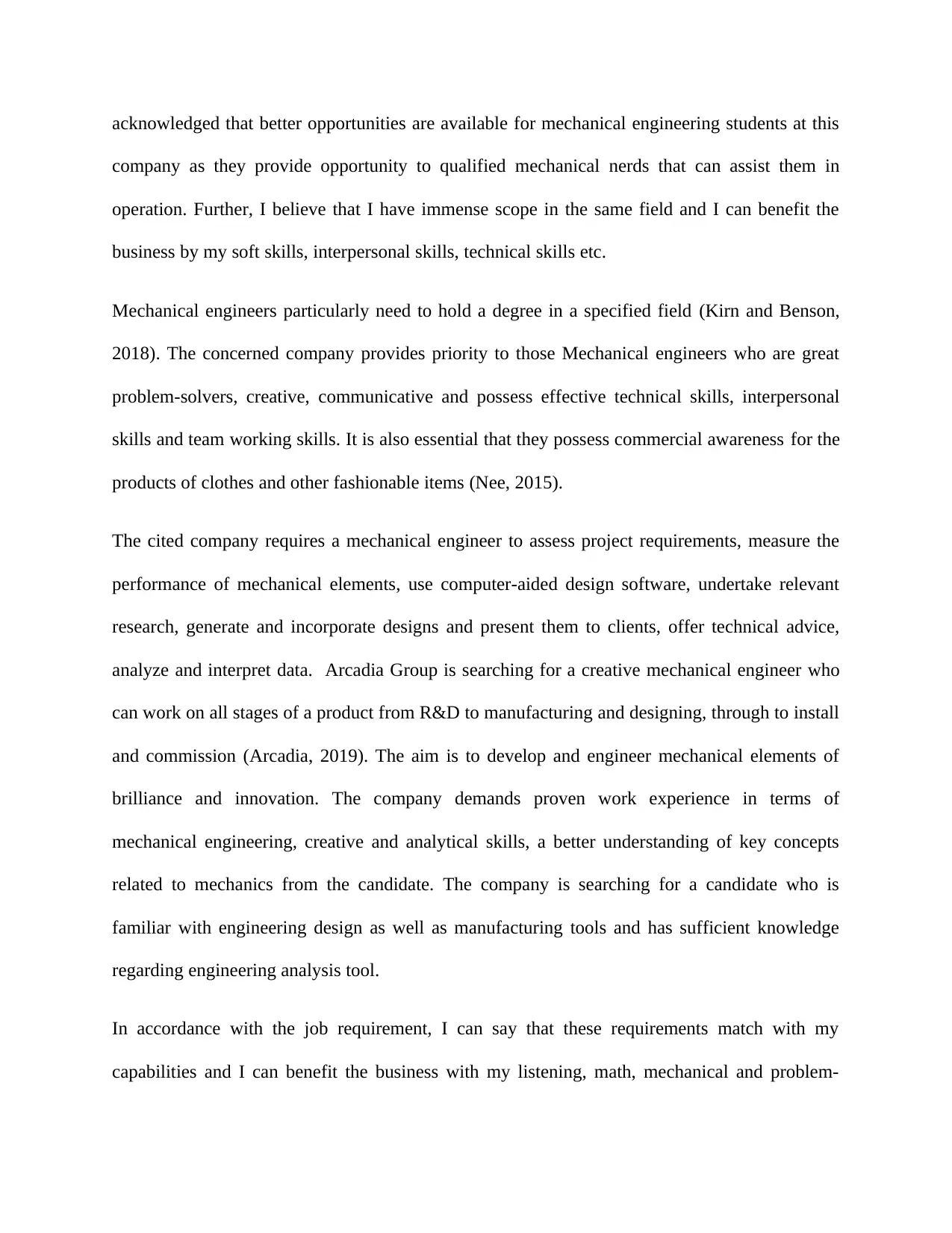
acknowledged that better opportunities are available for mechanical engineering students at this
company as they provide opportunity to qualified mechanical nerds that can assist them in
operation. Further, I believe that I have immense scope in the same field and I can benefit the
business by my soft skills, interpersonal skills, technical skills etc.
Mechanical engineers particularly need to hold a degree in a specified field (Kirn and Benson,
2018). The concerned company provides priority to those Mechanical engineers who are great
problem-solvers, creative, communicative and possess effective technical skills, interpersonal
skills and team working skills. It is also essential that they possess commercial awareness for the
products of clothes and other fashionable items (Nee, 2015).
The cited company requires a mechanical engineer to assess project requirements, measure the
performance of mechanical elements, use computer-aided design software, undertake relevant
research, generate and incorporate designs and present them to clients, offer technical advice,
analyze and interpret data. Arcadia Group is searching for a creative mechanical engineer who
can work on all stages of a product from R&D to manufacturing and designing, through to install
and commission (Arcadia, 2019). The aim is to develop and engineer mechanical elements of
brilliance and innovation. The company demands proven work experience in terms of
mechanical engineering, creative and analytical skills, a better understanding of key concepts
related to mechanics from the candidate. The company is searching for a candidate who is
familiar with engineering design as well as manufacturing tools and has sufficient knowledge
regarding engineering analysis tool.
In accordance with the job requirement, I can say that these requirements match with my
capabilities and I can benefit the business with my listening, math, mechanical and problem-
company as they provide opportunity to qualified mechanical nerds that can assist them in
operation. Further, I believe that I have immense scope in the same field and I can benefit the
business by my soft skills, interpersonal skills, technical skills etc.
Mechanical engineers particularly need to hold a degree in a specified field (Kirn and Benson,
2018). The concerned company provides priority to those Mechanical engineers who are great
problem-solvers, creative, communicative and possess effective technical skills, interpersonal
skills and team working skills. It is also essential that they possess commercial awareness for the
products of clothes and other fashionable items (Nee, 2015).
The cited company requires a mechanical engineer to assess project requirements, measure the
performance of mechanical elements, use computer-aided design software, undertake relevant
research, generate and incorporate designs and present them to clients, offer technical advice,
analyze and interpret data. Arcadia Group is searching for a creative mechanical engineer who
can work on all stages of a product from R&D to manufacturing and designing, through to install
and commission (Arcadia, 2019). The aim is to develop and engineer mechanical elements of
brilliance and innovation. The company demands proven work experience in terms of
mechanical engineering, creative and analytical skills, a better understanding of key concepts
related to mechanics from the candidate. The company is searching for a candidate who is
familiar with engineering design as well as manufacturing tools and has sufficient knowledge
regarding engineering analysis tool.
In accordance with the job requirement, I can say that these requirements match with my
capabilities and I can benefit the business with my listening, math, mechanical and problem-
⊘ This is a preview!⊘
Do you want full access?
Subscribe today to unlock all pages.

Trusted by 1+ million students worldwide
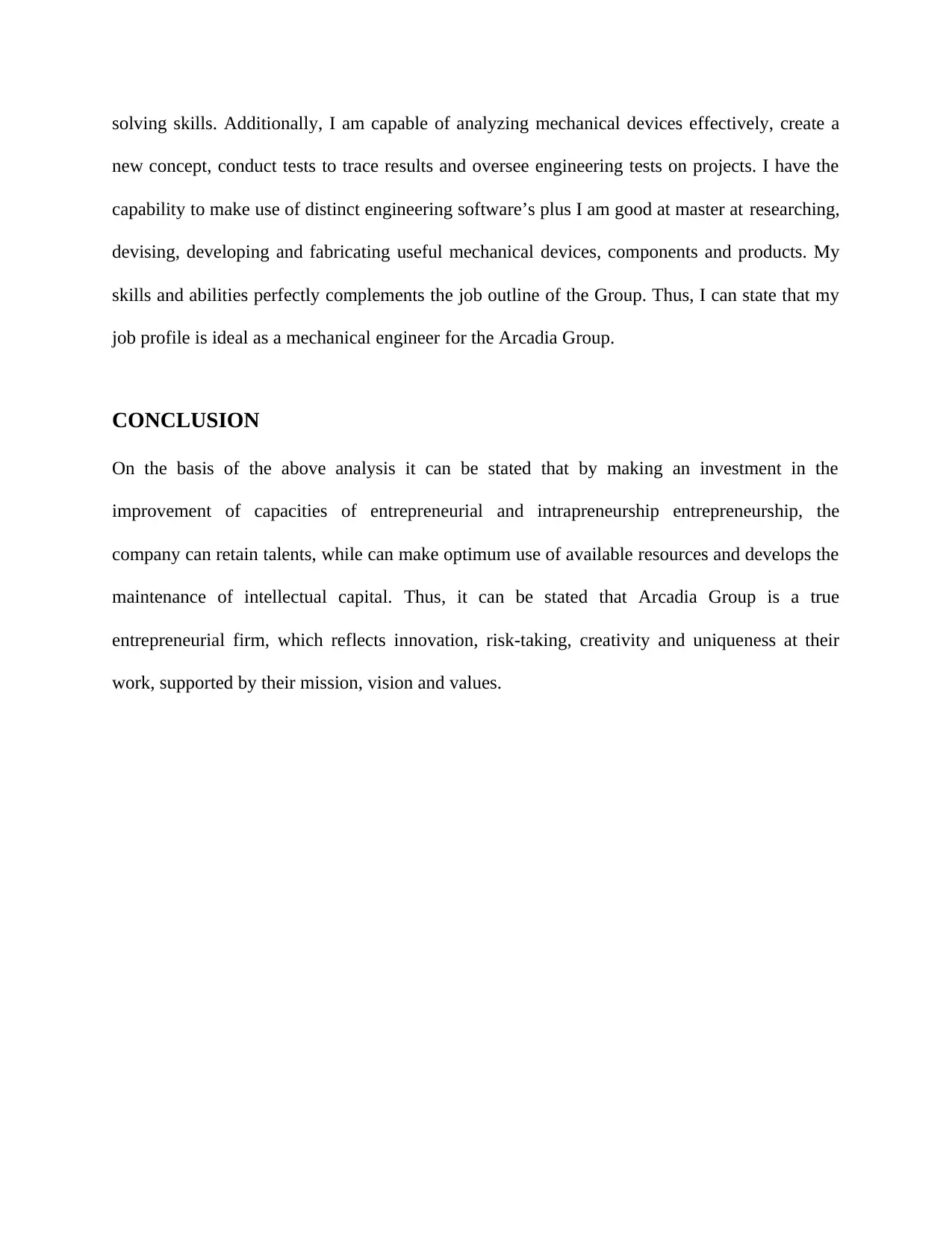
solving skills. Additionally, I am capable of analyzing mechanical devices effectively, create a
new concept, conduct tests to trace results and oversee engineering tests on projects. I have the
capability to make use of distinct engineering software’s plus I am good at master at researching,
devising, developing and fabricating useful mechanical devices, components and products. My
skills and abilities perfectly complements the job outline of the Group. Thus, I can state that my
job profile is ideal as a mechanical engineer for the Arcadia Group.
CONCLUSION
On the basis of the above analysis it can be stated that by making an investment in the
improvement of capacities of entrepreneurial and intrapreneurship entrepreneurship, the
company can retain talents, while can make optimum use of available resources and develops the
maintenance of intellectual capital. Thus, it can be stated that Arcadia Group is a true
entrepreneurial firm, which reflects innovation, risk-taking, creativity and uniqueness at their
work, supported by their mission, vision and values.
new concept, conduct tests to trace results and oversee engineering tests on projects. I have the
capability to make use of distinct engineering software’s plus I am good at master at researching,
devising, developing and fabricating useful mechanical devices, components and products. My
skills and abilities perfectly complements the job outline of the Group. Thus, I can state that my
job profile is ideal as a mechanical engineer for the Arcadia Group.
CONCLUSION
On the basis of the above analysis it can be stated that by making an investment in the
improvement of capacities of entrepreneurial and intrapreneurship entrepreneurship, the
company can retain talents, while can make optimum use of available resources and develops the
maintenance of intellectual capital. Thus, it can be stated that Arcadia Group is a true
entrepreneurial firm, which reflects innovation, risk-taking, creativity and uniqueness at their
work, supported by their mission, vision and values.
Paraphrase This Document
Need a fresh take? Get an instant paraphrase of this document with our AI Paraphraser
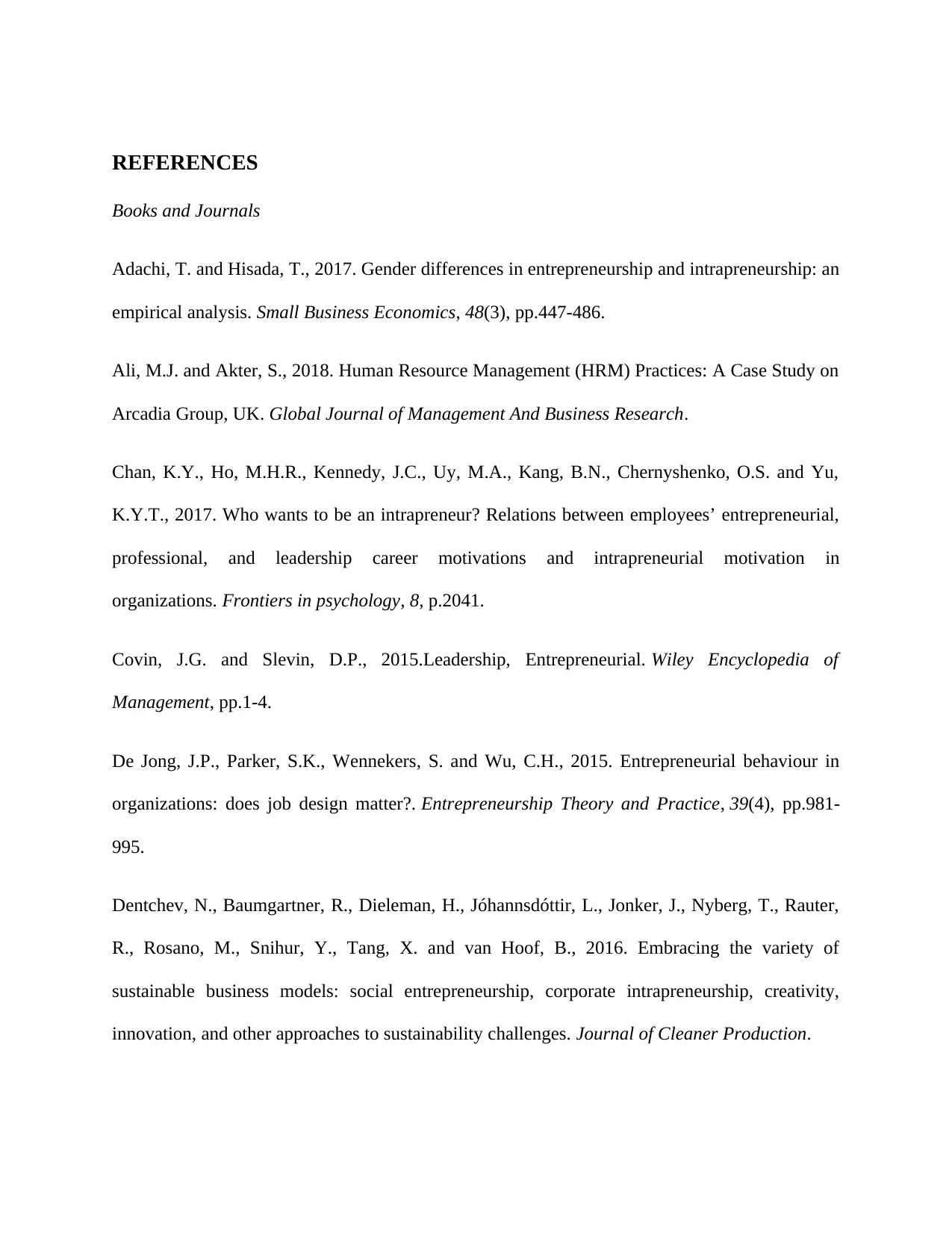
REFERENCES
Books and Journals
Adachi, T. and Hisada, T., 2017. Gender differences in entrepreneurship and intrapreneurship: an
empirical analysis. Small Business Economics, 48(3), pp.447-486.
Ali, M.J. and Akter, S., 2018. Human Resource Management (HRM) Practices: A Case Study on
Arcadia Group, UK. Global Journal of Management And Business Research.
Chan, K.Y., Ho, M.H.R., Kennedy, J.C., Uy, M.A., Kang, B.N., Chernyshenko, O.S. and Yu,
K.Y.T., 2017. Who wants to be an intrapreneur? Relations between employees’ entrepreneurial,
professional, and leadership career motivations and intrapreneurial motivation in
organizations. Frontiers in psychology, 8, p.2041.
Covin, J.G. and Slevin, D.P., 2015.Leadership, Entrepreneurial. Wiley Encyclopedia of
Management, pp.1-4.
De Jong, J.P., Parker, S.K., Wennekers, S. and Wu, C.H., 2015. Entrepreneurial behaviour in
organizations: does job design matter?. Entrepreneurship Theory and Practice, 39(4), pp.981-
995.
Dentchev, N., Baumgartner, R., Dieleman, H., Jóhannsdóttir, L., Jonker, J., Nyberg, T., Rauter,
R., Rosano, M., Snihur, Y., Tang, X. and van Hoof, B., 2016. Embracing the variety of
sustainable business models: social entrepreneurship, corporate intrapreneurship, creativity,
innovation, and other approaches to sustainability challenges. Journal of Cleaner Production.
Books and Journals
Adachi, T. and Hisada, T., 2017. Gender differences in entrepreneurship and intrapreneurship: an
empirical analysis. Small Business Economics, 48(3), pp.447-486.
Ali, M.J. and Akter, S., 2018. Human Resource Management (HRM) Practices: A Case Study on
Arcadia Group, UK. Global Journal of Management And Business Research.
Chan, K.Y., Ho, M.H.R., Kennedy, J.C., Uy, M.A., Kang, B.N., Chernyshenko, O.S. and Yu,
K.Y.T., 2017. Who wants to be an intrapreneur? Relations between employees’ entrepreneurial,
professional, and leadership career motivations and intrapreneurial motivation in
organizations. Frontiers in psychology, 8, p.2041.
Covin, J.G. and Slevin, D.P., 2015.Leadership, Entrepreneurial. Wiley Encyclopedia of
Management, pp.1-4.
De Jong, J.P., Parker, S.K., Wennekers, S. and Wu, C.H., 2015. Entrepreneurial behaviour in
organizations: does job design matter?. Entrepreneurship Theory and Practice, 39(4), pp.981-
995.
Dentchev, N., Baumgartner, R., Dieleman, H., Jóhannsdóttir, L., Jonker, J., Nyberg, T., Rauter,
R., Rosano, M., Snihur, Y., Tang, X. and van Hoof, B., 2016. Embracing the variety of
sustainable business models: social entrepreneurship, corporate intrapreneurship, creativity,
innovation, and other approaches to sustainability challenges. Journal of Cleaner Production.
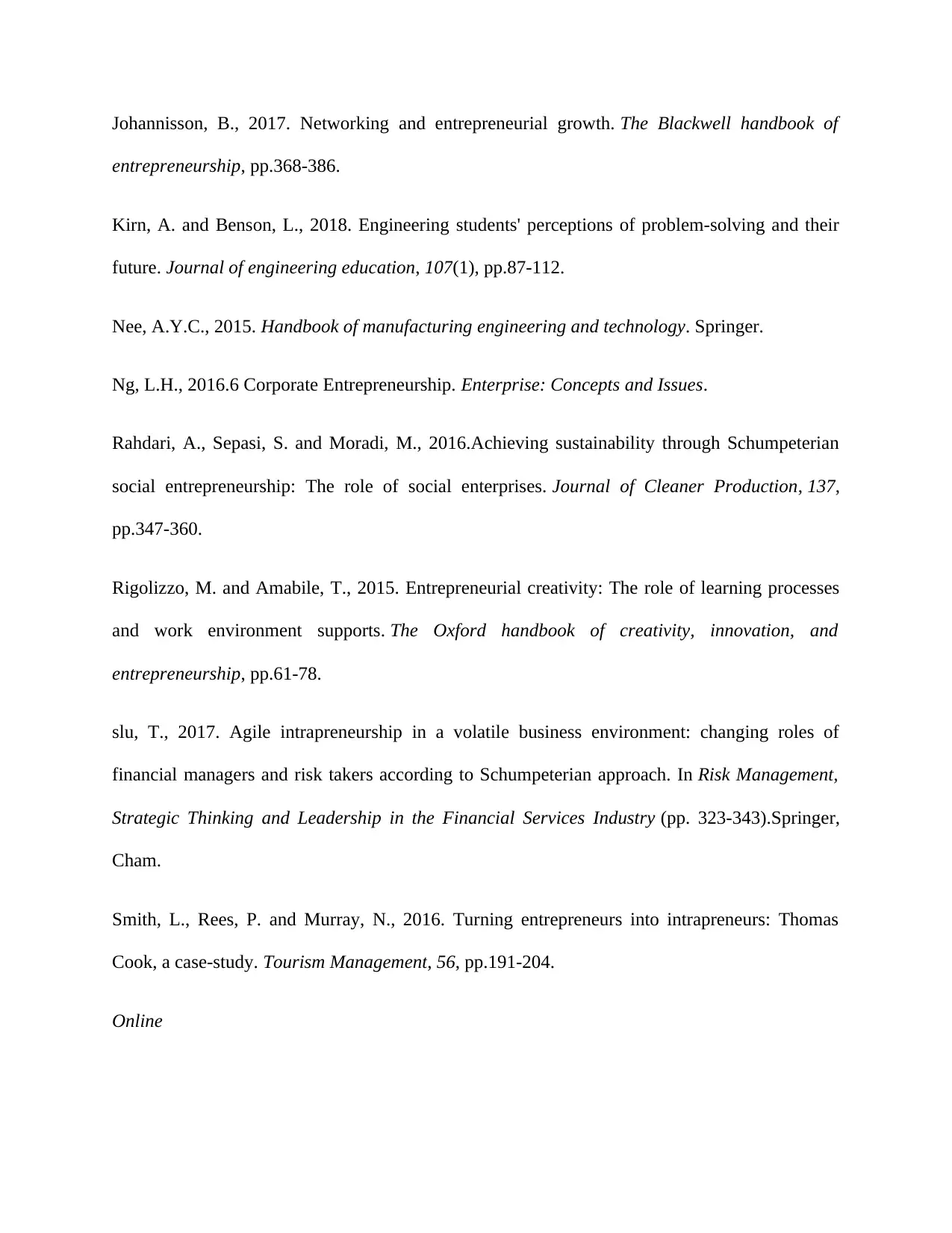
Johannisson, B., 2017. Networking and entrepreneurial growth. The Blackwell handbook of
entrepreneurship, pp.368-386.
Kirn, A. and Benson, L., 2018. Engineering students' perceptions of problem-solving and their
future. Journal of engineering education, 107(1), pp.87-112.
Nee, A.Y.C., 2015. Handbook of manufacturing engineering and technology. Springer.
Ng, L.H., 2016.6 Corporate Entrepreneurship. Enterprise: Concepts and Issues.
Rahdari, A., Sepasi, S. and Moradi, M., 2016.Achieving sustainability through Schumpeterian
social entrepreneurship: The role of social enterprises. Journal of Cleaner Production, 137,
pp.347-360.
Rigolizzo, M. and Amabile, T., 2015. Entrepreneurial creativity: The role of learning processes
and work environment supports. The Oxford handbook of creativity, innovation, and
entrepreneurship, pp.61-78.
slu, T., 2017. Agile intrapreneurship in a volatile business environment: changing roles of
financial managers and risk takers according to Schumpeterian approach. In Risk Management,
Strategic Thinking and Leadership in the Financial Services Industry (pp. 323-343).Springer,
Cham.
Smith, L., Rees, P. and Murray, N., 2016. Turning entrepreneurs into intrapreneurs: Thomas
Cook, a case-study. Tourism Management, 56, pp.191-204.
Online
entrepreneurship, pp.368-386.
Kirn, A. and Benson, L., 2018. Engineering students' perceptions of problem-solving and their
future. Journal of engineering education, 107(1), pp.87-112.
Nee, A.Y.C., 2015. Handbook of manufacturing engineering and technology. Springer.
Ng, L.H., 2016.6 Corporate Entrepreneurship. Enterprise: Concepts and Issues.
Rahdari, A., Sepasi, S. and Moradi, M., 2016.Achieving sustainability through Schumpeterian
social entrepreneurship: The role of social enterprises. Journal of Cleaner Production, 137,
pp.347-360.
Rigolizzo, M. and Amabile, T., 2015. Entrepreneurial creativity: The role of learning processes
and work environment supports. The Oxford handbook of creativity, innovation, and
entrepreneurship, pp.61-78.
slu, T., 2017. Agile intrapreneurship in a volatile business environment: changing roles of
financial managers and risk takers according to Schumpeterian approach. In Risk Management,
Strategic Thinking and Leadership in the Financial Services Industry (pp. 323-343).Springer,
Cham.
Smith, L., Rees, P. and Murray, N., 2016. Turning entrepreneurs into intrapreneurs: Thomas
Cook, a case-study. Tourism Management, 56, pp.191-204.
Online
⊘ This is a preview!⊘
Do you want full access?
Subscribe today to unlock all pages.

Trusted by 1+ million students worldwide
1 out of 13
Related Documents
Your All-in-One AI-Powered Toolkit for Academic Success.
+13062052269
info@desklib.com
Available 24*7 on WhatsApp / Email
![[object Object]](/_next/static/media/star-bottom.7253800d.svg)
Unlock your academic potential
Copyright © 2020–2026 A2Z Services. All Rights Reserved. Developed and managed by ZUCOL.





